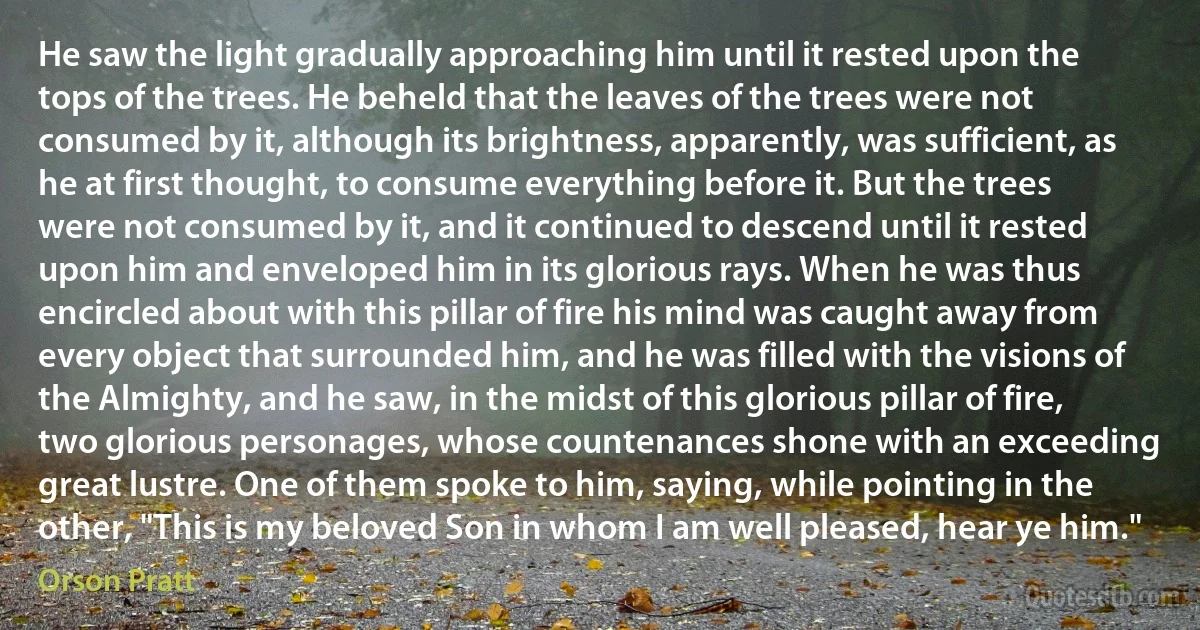
He saw the light gradually approaching him until it rested upon the tops of the trees. He beheld that the leaves of the trees were not consumed by it, although its brightness, apparently, was sufficient, as he at first thought, to consume everything before it. But the trees were not consumed by it, and it continued to descend until it rested upon him and enveloped him in its glorious rays. When he was thus encircled about with this pillar of fire his mind was caught away from every object that surrounded him, and he was filled with the visions of the Almighty, and he saw, in the midst of this glorious pillar of fire, two glorious personages, whose countenances shone with an exceeding great lustre. One of them spoke to him, saying, while pointing in the other, "This is my beloved Son in whom I am well pleased, hear ye him."
Orson PrattRelated topics
catch everything fire great leaves light lustre midst mind saw saying shine son spoke thought thus well whileRelated quotes
Roswell Gardiner has never wavered in his faith, from the time when his feelings were awakened by the just view of his own insignificance, as compared to the power of God! He then learned the first, great lesson in religious belief, that of humility; without which no man can be truly penitent, or truly a Christian. He no longer thought of measuring the Deity with his narrow faculties, or of setting up his blind conclusions, in the face of positive revelations. He saw that all must be accepted, or none; and there was too much evidence, too much inherent truth, a morality too divine, to allow a mind like his to reject the gospel altogether. With Mary at his side, he has continued to worship the Trinity, accepting its mysteries in an humble reliance on the words of inspired men.

James Fenimore Cooper
I regret that I am not clear as to what you intend by 'arisch'. I am not of Aryan extraction: that is Indo-Iranian; as far as I am aware none of my ancestors spoke Hindustani, Persian, Gypsy, or any related dialects. ... But if I am to understand that you are enquiring whether I am of Jewish origin, I can only reply that I regret that I appear to have no ancestors of that gifted people. ... I have been accustomed, nonetheless, to regard my German name with pride, and continued to do so throughout the period of the late regrettable war, in which I served in the English army. I cannot, however, forbear to comment that if impertinent and irrelevant inquiries of this sort are to become the rule in matters of literature, then the time is not far distant when a German name will no longer be a source of pride.

J. R. R. Tolkien
Don't forget that God sees you and watches you when you are in pain; He perceives even the beating of your heart. Consequently, He will not leave you without consolation and His fatherly protection. Naturally, the saints rejoiced in their afflictions; as for us, let us at least manage to accept affliction or pain patiently.
My child, pray within your heart, and the name of Jesus will become for you a comforting balm so that you can bear this trial of yours in a way which benefits you. You will greatly benefit from this trial if you submit yourself to it patiently. So again I say to you, with the almighty armor of prayer continually approach the omnipotent Lord more often, and you will come to know how He wondrously lifts the burden of pain and marvellously gives rest to sufferers.

Ephraim of Arizona
Behold therefore, this England of the Year 1200 was no chimerical vacuity or dreamland, peopled with mere vaporous Fantasms, Rymer's Foedera, and Doctrines of the Constitution, but a green solid place, that grew corn and several other things. The Sun shone on it; the vicissitude of seasons and human fortunes. Cloth was woven and worn; ditches were dug, furrowfields ploughed, and houses built. Day by day all men and cattle rose to labour, and night by night returned home weary to their several lairs. In wondrous Dualism, then as now, lived nations of breathing men; alternating, in all ways, between Light and Dark; between joy and sorrow, between rest and toil, between hope, hope reaching high as Heaven, and fear deep as very Hell. Not vapour Fantasms, Rymer's Foedera at all!

Thomas Carlyle
All the virtues which appeared in Christ shone brightest in the close of His life, under the trials He then met. Eminent virtue always shows brightest in the fire. Pure gold shows its purity chiefly in the furnace. It was chiefly under those trials which Christ endured in the close of His life, that His love to God, His honor of God's majesty, His regard to the honor of His law, His spirit of obedience, His humility, contempt of the world, His patience, meekness, and spirit of forgiveness towards men, appeared. Indeed, every thing that Christ did to work out redemption for us appears mainly in the close of His life. Here mainly is His satisfaction for sin, and here chiefly is His merit of eternal life for sinners, and here chiefly appears the brightness of His example which He has set us for imitation.

Jonathan Edwards (theologian)
